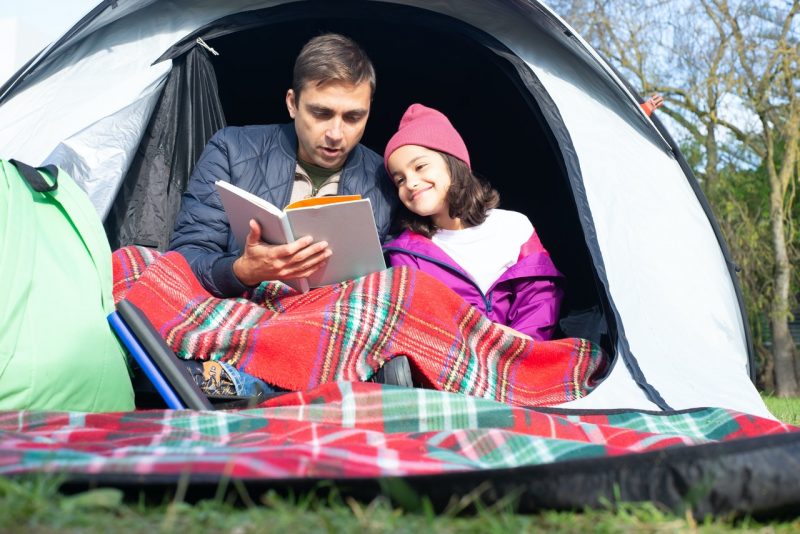Without any doubt, camping is one of the best ways to spend time with family. What is more, camping is highly beneficial to children. According to National Geographic, it’s a good way to improve their mental and physical health, reduce behavioral issues, and finally, enhance concentration and school performance. What we want to add is that kids adore spending their time in nature, and camping can become a genuine adventure for little ones. A perfect way to get closer through a shared passion, isn’t it?
Vagabondish is reader-supported. When you buy through links on our site, we may earn a small affiliate commission. Read our disclosure.
Camping with kids might look like a daunting task, but don’t panic. With the right planning, you can make sure your wildlife adventure goes smoothly, and we are here to help. We’ve prepared some tips on how to make camping with kids your new favorite family pastime.
#1: Get a Larger Tent

It goes without saying that you’ll need more space when camping with kids. Firstly, you’ll bring more staff and need more room to store it all, and secondly, a bigger tent means having a playing area, which truly makes a difference. Plus, you all will feel comfortable in a bigger shelter when it rains. Among the variety of tent designs and season ratings, a 4 season cabin tent is the best choice for camping with kids. It is spacious and will serve you all year round.
#2: Practice camping at home
If your children are outdoor newbies, set up a tent in the backyard or even in your living-room. Let them hang out and sleep in it so they get used to camping and sleeping in the tent. Not a tent owner yet? Check out the collection of tents of various sizes and designs at hot-tent.com.
#3: Engage kids in planning your trip
While planning a family outdoor adventure, ask for input from your kids, even if they’re young. Explore a map together, and ask what they are looking forward to doing on this trip. Also, it’s a good idea to give children the responsibility to pack their own camping gear. Of course, double-check your kid’s packing job before you set off.
#4: Pick the right site
Choose a campground with amenities that can meet your family’s needs. Some campgrounds have beaches, swimming areas, rivers or playgrounds; others provide picnic tables, flushing toilets and hot showers. Our advice is that if it’s your first time out with children, start small: go somewhere close to home and opt for a more developed campground.
#5: Plan your meals and stock up on snacks
You’ll be astonished how fresh air and physical activity make for ravenous young campers, so our advice is to plan your meals in advance. Keep in mind that your kids will consume more than usual, so take care that your meals are highly nutritious. And delicious of course! If you’ve run out of ideas, check out these mouth-watering family camping recipes from BBC Good Food. Also, make sure you’ve packed a double load of snacks – fruit, candy bars and nuts.
#6: Choose proper clothes
Check the weather and make sure your children are dressed appropriately to the expected outdoor conditions. If there’s a chance of rain, don’t forget to take rain jackets. Also, keep in mind that temperatures typically drop at night even if it’s hot during the day, so take care of something warm and cozy for the kids to sleep in. Dress your little ones in layers so they can put on or take off some clothing if they feel too cold or too warm. Finally, don’t forget a pair of shoes and warm socks, especially for evenings.
#7: Load up on wet wipes
Your young campers are very likely to use more wipes than ever, so bring several packs of baby wipes and non-toxic antibacterial wipes for those times when you need to wipe the kids down. It’s a great idea to set out a blanket or towel in front of your tent doors so you can sit down and wipe feet, hands, faces, arms and legs without tracking in dirt into the tent.
#8: Pack some entertainment
Your kids will love all that beautiful dirt, rocks and bugs, but it’s always a good thing to have a backup plan in case they suddenly get bored with all that stuff. So don’t forget to pack a couple of camping friendly toys, for instance, squirt guns, balls, coloring books, or card games.
#9: Teach your children good camping etiquette

Explain to your kids what is and isn’t acceptable behavior in a campground. Although everyone understands that kids will be kids, you can help by promoting good camping practices from the start. Here are some ideas to begin with:
- Teach them not to walk through other people’s campsites. Although it might appear a tough battle to win, especially with the little ones, it’s worth getting them used to this rule.
- Explain to your kids that you should leave the natural area as you found it.
- Talk to your children about being considerate to your neighbors: remind them to keep their voices relatively low, keep any music down, and avoid screaming.
- Give your children age-appropriate lessons on fire safety. Also, explain to them that it can be dangerous to touch a lantern.
- Make sure your kids know that they aren’t allowed to pet any wild animals or eat anything they find in the woods.
#10: Think of safety
For added safety, give your kid a whistle and a headlamp or small flashlight with a wrist strap – this will help you locate them in case they leave the campsite.


